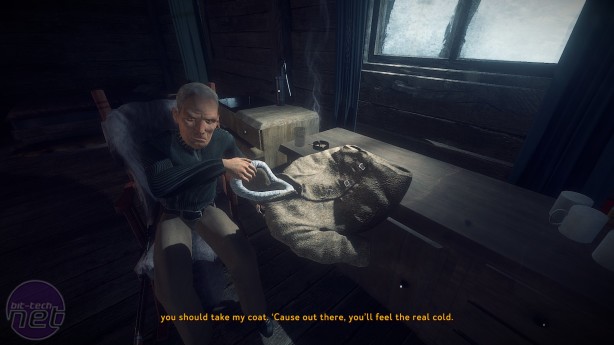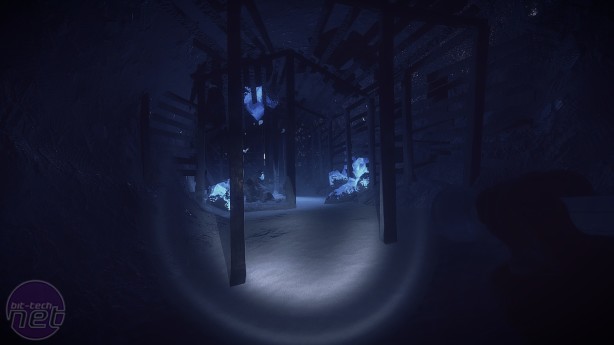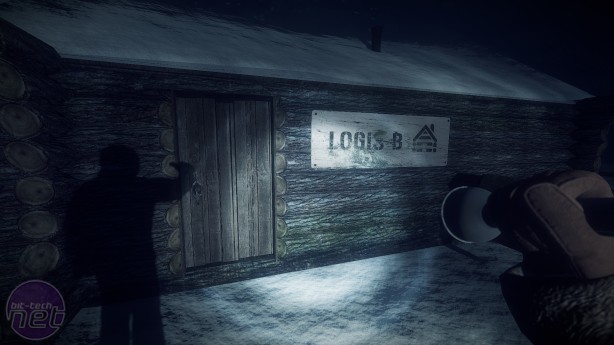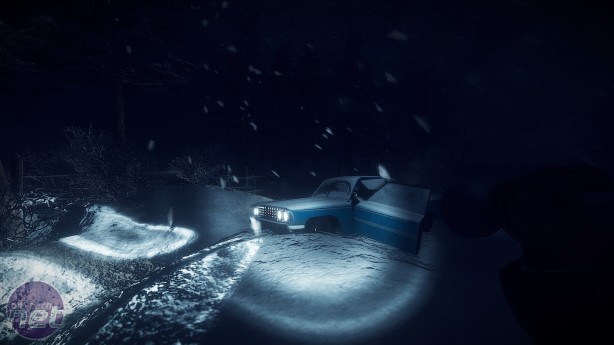
In addition, Kona boasts a dynamic narration which triggers when you perform certain actions, such as entering a new area, picking up items of interest, or taking photographs of potential clues. These too provide further information about the events that transpired before Faubert arrived.
All of this information is collected in Faubert’s notebook, which is perhaps Kona’s best mechanical device. Not only does it show you what information you have discovered, it also hints at what you haven’t discovered, with empty spaces that should contains pictures or paragraphs highlighted in red pen. It’s a smart way of tracking the player’s progress, demonstrating visually how thorough they are being in their investigation.
It’s important to point out that you don’t need to find everything in the notebook to finish the game, far from it. Many areas of Amitapek Lake are optional, although you won’t know which ones these are before you arrive. Crucially though, they are all interesting to explore, with tantalising mysteries and puzzles of their own. Some of these are straightforward, such as finding keys to a shed containing useful supplies. Others are more involved, like finding the code to a safe that contains illuminating information about the murder victim and a possible motive for his killing.
All of this is delicately woven together, allowing you the freedom to explore as you please, yet never feeling like you’re heedlessly running around collecting stuff. Almost everything has been carefully handcrafted and placed with a clear purpose. There are some fantastic smaller touches too, like the Tarantino-esque title cards that appear when you arrive at a new location, and the way certain item descriptions are inscribed on environment surfaces in a similar font. Most of all, I love how gosh-darned tactile the game is, with so many doors and drawers to be opened, so many objects to be picked up and tinkered with. Kona works enormously hard to make you feel the physicality of its world, and I admire that a lot.
Part of me would like to stop the review here and slap an Outstanding award on Kona, but unfortunately I can’t. Despite my enthusiasm for the game, I have a couple of fairly significant issues with it. Firstly, the inventory system is both cumbersome and unnecessary. It’s divided up into several categories, which include 'equipment', 'consumables' and, er, 'inventory', all of which contribute to a maximum carrying capacity. The system is about as clear as the government’s strategy for leaving the EU, and you probably won’t pay any attention to it until the middle of the game when suddenly you can’t pick stuff up anymore. This results in a lot of unnecessary backtracking and agonising over which items you need and which you don’t, which only serves to slow the game down and frustrate the player.
Secondly, while I like the idea of the omniscient narrator, I find both the choice of the narrator and the style of narration questionable. Forrest Rainer lends his soulful, gravelly voice to the narration, but he sounds like he’s reading through the script for the first time, and the delivery isn’t always tonally consistent with the subject at hand. Moreover, the script itself has a wry, almost wistful quality at odds with the strange and spooky atmosphere of Amitapek Lake. It didn’t ruin the experience for me, but there were times when it did distract from it.
Finally, as the game progresses, the story teeters between a grounded detective story and a more supernatural tale that’s part Fargo and part Twin Peaks. Sadly, toward the end that supernatural element becomes much more central, and the climax of the game is, frankly, dreadful. I don’t mind how the story ended so much as the implementation of the final act, which, without going into too much detail, is completely out of character with the rest of the game, as well as being totally unsuited to the core mechanics.
These problems mean that Kona falls just short of the sleuthing masterpiece that it could be. Nevertheless, I still think it’s a remarkable game, making intelligent use of an open-world structure, and blending storytelling, exploration, and puzzling in some really novel ways. It’s a huge step forward for first-person adventures, and one of my favourite games of the year so far.
All of this information is collected in Faubert’s notebook, which is perhaps Kona’s best mechanical device. Not only does it show you what information you have discovered, it also hints at what you haven’t discovered, with empty spaces that should contains pictures or paragraphs highlighted in red pen. It’s a smart way of tracking the player’s progress, demonstrating visually how thorough they are being in their investigation.
It’s important to point out that you don’t need to find everything in the notebook to finish the game, far from it. Many areas of Amitapek Lake are optional, although you won’t know which ones these are before you arrive. Crucially though, they are all interesting to explore, with tantalising mysteries and puzzles of their own. Some of these are straightforward, such as finding keys to a shed containing useful supplies. Others are more involved, like finding the code to a safe that contains illuminating information about the murder victim and a possible motive for his killing.
All of this is delicately woven together, allowing you the freedom to explore as you please, yet never feeling like you’re heedlessly running around collecting stuff. Almost everything has been carefully handcrafted and placed with a clear purpose. There are some fantastic smaller touches too, like the Tarantino-esque title cards that appear when you arrive at a new location, and the way certain item descriptions are inscribed on environment surfaces in a similar font. Most of all, I love how gosh-darned tactile the game is, with so many doors and drawers to be opened, so many objects to be picked up and tinkered with. Kona works enormously hard to make you feel the physicality of its world, and I admire that a lot.
Part of me would like to stop the review here and slap an Outstanding award on Kona, but unfortunately I can’t. Despite my enthusiasm for the game, I have a couple of fairly significant issues with it. Firstly, the inventory system is both cumbersome and unnecessary. It’s divided up into several categories, which include 'equipment', 'consumables' and, er, 'inventory', all of which contribute to a maximum carrying capacity. The system is about as clear as the government’s strategy for leaving the EU, and you probably won’t pay any attention to it until the middle of the game when suddenly you can’t pick stuff up anymore. This results in a lot of unnecessary backtracking and agonising over which items you need and which you don’t, which only serves to slow the game down and frustrate the player.
Secondly, while I like the idea of the omniscient narrator, I find both the choice of the narrator and the style of narration questionable. Forrest Rainer lends his soulful, gravelly voice to the narration, but he sounds like he’s reading through the script for the first time, and the delivery isn’t always tonally consistent with the subject at hand. Moreover, the script itself has a wry, almost wistful quality at odds with the strange and spooky atmosphere of Amitapek Lake. It didn’t ruin the experience for me, but there were times when it did distract from it.
Finally, as the game progresses, the story teeters between a grounded detective story and a more supernatural tale that’s part Fargo and part Twin Peaks. Sadly, toward the end that supernatural element becomes much more central, and the climax of the game is, frankly, dreadful. I don’t mind how the story ended so much as the implementation of the final act, which, without going into too much detail, is completely out of character with the rest of the game, as well as being totally unsuited to the core mechanics.
These problems mean that Kona falls just short of the sleuthing masterpiece that it could be. Nevertheless, I still think it’s a remarkable game, making intelligent use of an open-world structure, and blending storytelling, exploration, and puzzling in some really novel ways. It’s a huge step forward for first-person adventures, and one of my favourite games of the year so far.


MSI MPG Velox 100R Chassis Review
October 14 2021 | 15:04





![Event[0] Review](http://images.bit-tech.net/content_images/2016/09/event0-review/featured_double.jpg)







Want to comment? Please log in.